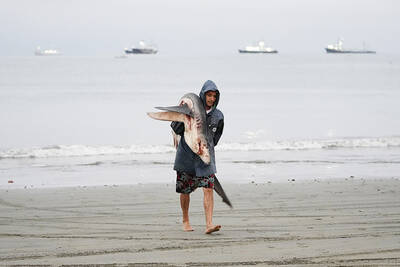Residents of a Puerto Rican town are vowing to fight a planned monkey-breeding facility for fear that the primates will escape and overrun their community.
The facility, which will supply monkeys to pharmaceutical companies for research, was cleared for construction this week.
Locals in Guayama said on Friday they didn’t want their southern coastal town to become another Lajas — a town that today is plagued by monkeys that escaped decades ago from research facilities.
“It is certain that some monkeys are going to escape,” Guayama community leader Roberto Brito said. “This will affect agriculture and people’s health. ... We are not going to give up. We do not want the project there.”
But Mauritius-based company Bioculture’s local development and community coordinator, Jacinto Rivera Solivan, disputed the claim, saying the “probability of a monkey escaping is zero.”
Hundreds of people are signing a petition asking the governor of the US Caribbean territory and its resident commissioner to halt the project, Brito said.
Construction of the 1,200m² facility was temporarily suspended because Bioculture did not have the appropriate environmental permits, said Francisco Gonzalez Suarez, Guayama city planner.
They were awarded the permits this week, he said, but residents question why public hearings were not held.
Spokesman Felix Figueroa said Guayama Mayor Glorimari Jaime was not available for comment.
The facility will hold at least 3,000 macaque monkeys that will be sold for up to US$3,000 each, Gonzalez said.
Bioculture had considered building the facility in south Florida, but opted for Puerto Rico because the island’s pharmaceutical companies could test the animals without having to transport them elsewhere, Rivera said.

WAKE-UP CALL: Firms in the private sector were not taking basic precautions, despite the cyberthreats from China and Russia, a US cybersecurity official said A ninth US telecom firm has been confirmed to have been hacked as part of a sprawling Chinese espionage campaign that gave officials in Beijing access to private texts and telephone conversations of an unknown number of Americans, a top White House official said on Friday. Officials from the administration of US President Joe Biden this month said that at least eight telecommunications companies, as well as dozens of nations, had been affected by the Chinese hacking blitz known as Salt Typhoon. US Deputy National Security Adviser for Cyber and Emerging Technologies Anne Neuberger on Friday told reporters that a ninth victim

Russia and Ukraine have exchanged prisoners of war in the latest such swap that saw the release of hundreds of captives and was brokered with the help of the United Arab Emirates (UAE), officials said on Monday. Ukrainian President Volodymyr Zelenskiy said that 189 Ukrainian prisoners, including military personnel, border guards and national guards — along with two civilians — were freed. He thanked the UAE for helping negotiate the exchange. The Russian Ministry of Defense said that 150 Russian troops were freed from captivity as part of the exchange in which each side released 150 people. The reason for the discrepancy in numbers

A shark attack off Egypt’s Red Sea coast killed a tourist and injured another, authorities said on Sunday, with an Italian Ministry of Foreign Affairs source identifying both as Italian nationals. “Two foreigners were attacked by a shark in the northern Marsa Alam area, which led to the injury of one and the death of the other,” the Egyptian Ministry of Environment said in a statement. A source at the Italian foreign ministry said that the man killed was a 48-year-old resident of Rome. The injured man was 69 years old. They were both taken to hospital in Port Ghalib, about 50km north

MISSING: Prosecutors urged the company to move workers out of poor living conditions to hotels, but residents said many workers had already left the town Brazil has stopped issuing temporary work visas for BYD, the Brazilian Ministry of Foreign Affairs said on Friday, in the wake of accusations that some workers at a site owned by the Chinese electric vehicle producer had been victims of human trafficking. The announcement came days after labor authorities said they found 163 Chinese workers who had been brought to Brazil irregularly in “slavery-like” conditions at the BYD factory construction site in the northeastern state of Bahia. The workers were employed by contractor Jinjiang Group, which has denied any wrongdoing. Later, the authorities also said the workers were victims of human trafficking,